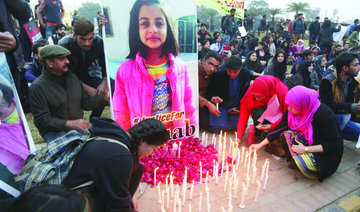ISLAMABAD: Punjab Chief Minister Shehbaz Sharif’s demand this week that the serial killer pedophile Imran Ali be publicly hanged has sparked a debate on the amendment of a section of law in Pakistan.
Angry protesters across the country are pressing for the implementation of Sharif’s demand. Those supporting the amendment claim the threat of execution will serve as a deterrent to child rapists and murders.
On Wednesday, Sen. Rehman Malik, chairman of the Senate Standing Committee on Interior and Narcotics Control, tabled Criminal Law Amendment Act Bill 2018, which his committee passed.
The Senate has now been asked to also pass the proposed bill, which seeks an amendment to Section 364-A of the Pakistan Penal Code to include “public hanging” for individuals found guilty of abducting or raping children under 14 years of age.
“This is a pressing demand of the people of Pakistan,” said Rehman, who urged the Senate to adopt the amendment, which has been sent to the Law, Interior, and Human Rights Committees of the House for examination by Senate Chairman Raza Rabbani.
The current statute penalizes the abduction and rape of victims under 14 years of age “with death or with imprisonment for life or with rigorous imprisonment for a term which may extend to fourteen years and shall not be less than seven years.”
Sen. Farhatullah Babur strongly opposes the proposed amendment warning it would “brutalize society” if the law is passed and the perpetrator is publicly executed.
“Why should Parliament get involved in making an amendment?” Babur asked, speaking to Arab News on Friday. “Don’t make a law for it. If the jail manual does permit (public hanging) in specific cases, then go ahead with that, because if you make a law for this kind of crime, tomorrow there will be a demand (to include) other crimes.”
Rule 359 of the Pakistan Prison Rules 1978 manual allows execution of a death row inmate outside of prison premises.
Some of the lawmakers argue the matter should be left for the court to decide, but those supporting the bill are in the majority and are calling for even tougher laws against sexual predators targeting children.
Dr. Farid Paracha, deputy chief of Jamaat-e-Islami (JI), referred to the teachings of the Qur’an and Islam and voiced his support for the bill.
“These type of culprits should be publicly executed,” he told Arab News, suggesting Ali’s execution would “set an example.”
Sen. Saud Aziz of the ruling Pakistan Muslim League-Nawaz (PML-N) party, has pressed for stoning the criminal to death, seeking amending the relevant section of law, and the inclusion of public hanging in the prison rule book.
Capital punishment is a legal penalty in Pakistan. A moratorium on executions was placed in 2008 but lifted in 2014 following the massacre of 132 schoolchildren by militants. However, Barrister Humayun Chatha said Pakistan has no “law in existence” for public executions.
“There is no such law…and never was,” Chatha told Arab News. “It is very hard to say how much difference (the amendment would make as a) deterrent.” He suggested it “may be useful,” but warned that “a lot more is required to curb such heinous crimes.”
Zainab Ansari was abducted from the street near her aunt’s house in Kasur on Jan. 4. Her body was discovered in a garbage dump five days later. An autopsy report revealed she was sexually assaulted and then murdered. Imran Ali confessed to her murder, and those of at least eight other children.
Sen. Mushahid Hussain Syed told Arab News: “What is required in the present circumstances is that justice be done swiftly, while ensuring a stringent application of laws with a more efficient and empathetic police that quickly acts in future in such cases of child rape and kidnappings.”
But analyst Qamar Cheema referred to Saudi Arabia’s crime-control track record and claimed stringent measures must be adopted to cleanse this specific crime from society.
“Saudi Arabia, where (public execution) exists, has witnessed a sharp decline in crimes. People (in Pakistan) really feel that the law does not serve them, so they want stricter punishments,” Cheema told Arab News, adding that Parliament must respect the demand of the people and pass the legislation for public execution to rebuild lost trust in the judicial system.
According to Sahil, a child protection organization in Pakistan that works with the government, 4,139 cases of child sexual abuse were reported in 2016. Alarmingly, more than 720 cases since 2015 have been reported in Kasur, Advocate Fariha Jaffar Bajwa, Media and Advocacy Consultant at the National Commission on the Status of Women, told Arab News.
“There is a need to reintroduce public execution to set an example and to send a message to pedophiles that there is zero tolerance for such heinous crimes,” she said.
Clamor in Pakistan for public hanging of rape convicts
Clamor in Pakistan for public hanging of rape convicts














